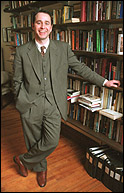Allan Hepburn
Meet Allan Hepburn, P. I. for hire (that's professor of intrigue).
 PHOTO: Owen Egan
PHOTO: Owen Egan |
|
From the Gothic novel to espionage literature, Hepburn has been enthralling students since last September with discussions of the fantastic and the ambiguous.
His classes examine the how of whodunits through the lens of conspiracy, leaks and double agents. His hard-boiled dynamism won him an award for excellence in teaching from the University of Toronto, where he spent five years.
One of Hepburn's chief interests lay in the seductive identities and politics of spy fiction.
"Spies are quintessential 20th century figures," declares Hepburn. He sees them as an apt metaphor for an era of confused identities. "To which political side do I belong? How do I know what my allegiances are in a century that has told us that we had to have allegiances? You have to improvise a kind of identity in that situation.
"The shadowy figure of the spy is somewhere in between systems of good and bad, but also of different governments. How do you know when somebody goes out in the cold or crosses a boundary that this person is going to come back? How do you know if they're going to remain ideologically free of taint?"
Espionage literature contains all sorts of dilemmas. For instance, how to keep your ethics in check, particularly when love gets in the way?
The personal clashes with the political in a novel by Elizabeth Bowen in which a woman discovers that her lover is a Nazi spy. It's the Blitz in London. What does she do? Is she a collaborator if she does nothing? "It's a good novelistic question. Are your erotic interests in some ways contaminated by politics and vice versa?"
Hepburn points out that you can't have a spy narrative without fear. Fear of getting caught, fear of conflicting interests. "Fear comes from that overlap of ideologies. . . You're afraid that you can hold more than one conviction at the same time."
Although the Cold War has thawed, paranoia lives on today in the world of corporate espionage. "Who is reading my e-mail? Why do I think I'm being overseen or not?" There's always the worry that "nothing is ever itself"-- the principle of spy fiction.
We all live in an age of surveillance, although America and Britain corner the literary spy market.
Some Canadians write spy stories, but Hepburn speculates that we are "not ideologically convinced enough to generate a spy narrative tradition." Generally outward looking, Canadians may not be sufficiently paranoid.
Ours is a literature filled with getting lost in the wilderness and, as Hepburn puts it, "It's really hard to be paranoid when you're lost. You're worried about being found, not about being seen."
Hepburn is working on a book, Intrigue: Culture in the Time of Espionage, in which he's hot on the trail of themes such as codes, leaks and fear. Codes and enigmas figure prominently in spy fiction. Titles can be riddles: The Thirty-Nine Steps, The Third Man. Characters are codes: 007, Q. Even the narrative is a subterfuge, the plot as slippery as a sweaty palm.
"Spy narratives are fixated on machines and gadgets, as analogues for plots as well. The timepiece, the watch ticking, the gun is the analogue for the novel itself."
Hepburn is delighted with the quality of McGill students he has seen so far. When he started teaching here, he found himself rewriting lectures to make them more difficult. "It makes my job that much harder, making sure I'm on top of everything. It's a challenge, but in the best sense."
The secret identities of Allan Hepburn include those of classically trained pianist, book reviewer, journalist, translator,
fiction editor, and mole for a Toronto literary agent.
He feels this experience helps him be of use to students considering their options after graduation. "I think English majors and honour students often go on to very interesting careers. You end up doing things that draw together from your diverse capacities."

